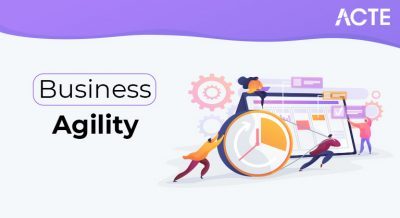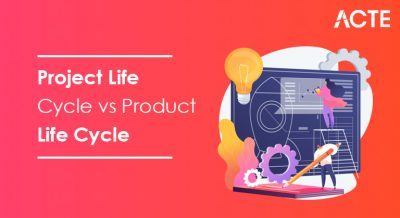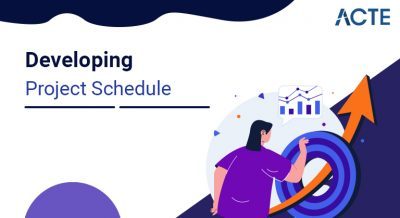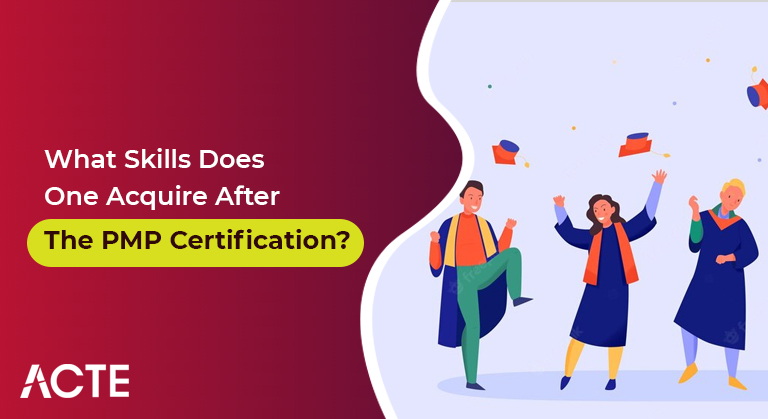
For any professional to climb the corporate ladder, they must not just show competence in industry skills but also reflect a leadership and motivational trait. The PMP equips one with analysis, management and team skills—skills that are in much demand across sectors.
- What Comes After the PMP® Certification
- What to do After Earning Your PMP Certification
- Continuing Education
- Guide To Earn PDU
- Accelerate. through free PDU
- Job Opportunities After PMP Certification
- Next Certification After PM
- PMP Certification and Training Requirements
- Getting Project Management Experience Without a PMP
- Jobs that Give You Project Management Experience
- This Is What A White Collar Worker Looks Like After PMP Certification
- Conclusion
What Comes After the PMP® Certification:
Earning the Project Management Professional (PMP)® certification, which is a highly respected and globally recognized certificate of project management excellence, is a difficult feat. You should be proud of yourself for this!. So, what comes after PMP certification? The answers in this Project Management Academy guide are what you can expect from the Project Management Institute (PMI), your career, and more.
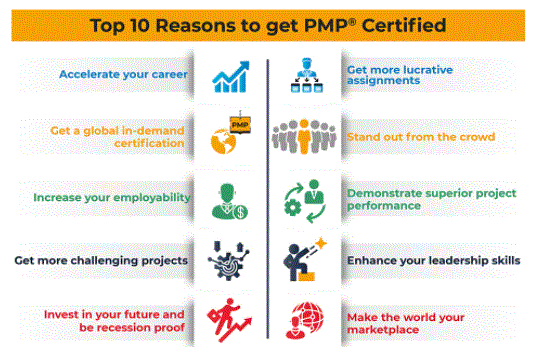
- Your PMP Credential Certificate
- A congratulatory letter
- Tips for maintaining your credibility
- In the meantime, you can use your digital badge on social media, update your professional information, and provide verification for employers.
- Update your resume, business card, LinkedIn profile, online biography, and more.
- Include the PMP credential online in your name (ex: FirstName LastName, PMP).
- Add the PMP logo to your personalised name card.
- Share your digital badge on social media or on your website or company card.
- Updating your professional information to reflect your achievement helps to demonstrate your skills and experience in project management.
What to do After Earning Your PMP Certification:
Once you clear the PMP exam, here are a few steps you can follow to make the most of your new professional recognition.
Receive Your PMP Certificate by Mail
As soon as you pass the PMP exam, you are officially a certification holder. You will receive a digital badge immediately through Credley, but it may take 6-8 weeks for the certificate to arrive by mail. PMI will send you the following:
Update your professional information:
The PMP certification is the global standard for project management worldwide and in any industry. Show off your qualifications to current and potential employers and clients with this checklist:
Request Your PMP Lapel Pin:
PMI will not automatically send your PMP lapel PIN. You can request it by mail at no cost by logging into the PMI website, going to the Marketplace and adding it to your cart.
- PMI requires certification holders to participate in professional development activities to continue earning PDUs and gain industry insights. These activities fall under two categories: education and giving back to the profession.
- Education PDU includes learning opportunities that teach or improve your technical, leadership, or strategic and business management skills. Out of your 60 required PDUs per cycle, you need a minimum of 35 education PDUs.
- Education PDUs align with the PMI Talent Triangle®, which describes ideal skills as a combination of technical, leadership and strategic competencies. Out of your 35 Essential Education PDUs per cycle, you need at least 8 Technical PDUs, 8 Leadership PDUs and 8 Strategic PDUs. The remaining 11+ PDUs can come in any area of the Talent Triangle.
- Giving Back PDU includes any activity in which you contribute your knowledge and skills to help build the project management industry. You can count up to 25 Giving Back PDUs for your continuing certification needs.
- Sharing your project management knowledge and skills can be valuable to the profession and to enriching your own professional development, which is why PMI includes the Giving Back in CCR program. However, it is an alternative way to earn PDU.
- Like contact hours, one hour of instruction or activity equals one PDU. Unlike contact time, these PDUs must be earned during your CCR cycle. As you earn PDU, you can submit information to PMI through the CCR system. You can claim credit for only one PDU per hour of course or activity.
- Once PMI verifies that you have met your PDU requirements, you will receive further instructions to submit your renewal fee. After your fee is processed, PMI will send your updated certificate and new CCR cycle dates.
Continuing Education:
Learning does not end after certification. Project management practises are constantly improving. As a result, you must meet PMI’s Continuous Certification Requirements (CCR) within a given CCR cycle to maintain your certification status. PMI’s CCR program helps certification holders to continually improve their project management skills. Staying informed about relevant practises will prepare you for the complex and ever-changing modern business environment.
For PMP certification, you will have three years from the date you pass the PMP exam to earn a minimum of 60 Professional Development Units (PDUs). If you earn more than this minimum, some of the PDUs you earned in the last 12 months of your CCR cycle may be applied to your next cycle. If you do not meet the minimum requirements during your CCR cycle, the following may happen:
Suspension: If you do not earn 60 PDUs within your 3 year cycle, you will be placed under suspended status for one year or till you earn the required PDUs and complete the renewal process . During this period, you cannot use the certification designation. Being suspended does not change the dates for your next CCR cycle.
Termination: If you do not earn the required PDU or do not complete the renewal process while in suspended state, you will lose your certification status. To reapply PMP certification, you must reapply, resubmit all fees, and retake the PMP exam.
Retirement: If you have been a certification holder in good standing for at least ten years but wish to retire and voluntarily end your active certification status.
Guide To Earn PDU:
Accelerate. through free PDU:
The CCR Handbook has detailed guidelines on different ways to earn PDU. However, one of the best ways to earn a guaranteed free PDU for meeting PMI requirements is to use the Project Management Academies PMAccelerate program. Join today for exclusive access to training, discounts and other resources.
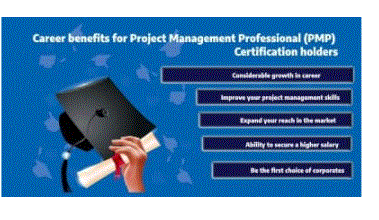
- Increase your productivity
- Provide networking opportunities
- Show management that you are ready for career advancement
- Provide leverage for salary increases
- Prove your credentials when applying for new assignments
- Your local PMI chapter is a great place to chat with fellow PMI members, learn more about project management trends around the world, and share resources, ideas, and experiences.
- Even seasoned project managers who are highly skilled in several areas of project management can learn a lot from studying and passing the PMP exam. As a result, employers view PMP credential holders as valuable assets to protect and grow the organisation.
- Holders of the PMP credential have proven “soft” life skills in managing people and communications. Passing the PMP exam also requires difficult skills such as monitoring and producing deliverables, calculating costs and other project elements, and using computer programs to manage projects more efficiently. Having a certified project manager on the team opens up new possibilities for employers looking to take on new, large or complex projects.
Job Opportunities After PMP Certification:
After passing the PMP exam, you will probably experience rapid career growth, especially if you are a PMI member. Learn more about why the job prospects for PMP credential holders are so great everywhere in the world.
What is the estimated job outlook for Certified PMP?
Strategically use your PMP credential to help accelerate your career in many ways. Earning your certification paves the way for your personal and professional growth. Here are some ways in which a PMP certificate can help boost your job outlook.
What do employers look for in a certified PMP?
Next Certification After PM:
If you’re wondering which credential to pursue next, take a moment to consider two things first:
Where: Where do you live and work, or are you planning to relocate? If you want to live or work in the United Kingdom or any Commonwealth country, consider getting your PRINCE2 certification. However, if you live or work in the United States or elsewhere, the PRINCE2 credential is somewhat redundant. Instead, focus on meeting your PMP CCR requirements.
What: What is your primary work area? You may benefit from PMI Risk Management Professional (PMI-RMP)® certification, PMI Agile Certified Practitioner (PMI-ACP)® credential, Certified Scrum Masters (CSM) training course, or other accreditation for specific industries. Remember, you need to maintain your PMP certification by earning Professional Development Units. Don’t underestimate the amount of time you will need to earn the required PDU during your CCR cycle! It may be best to focus on maintaining your creditworthiness rather than obtaining additional certification.
- ACTE PMP Certification training course can help you meet your 35 hours requirement of project management education with 36 hours of instructor-led training and 29 hours of e-learning content. The course also prepares you for the exam with six practical projects and seven simulation test papers with a 100 percent money-back guarantee. All you need to do is prepare and walk with confidence to crack the exam and earn the PMP certification.
- In addition to completing the required education and passing the exam, you must also have two to four years of project management experience. Depending on your level of formal education, PMPs require a set number of hours of experience. With a four-year degree, you’ll need to provide 4,500 hours of leading and directing projects, and without a four-year degree, you’ll need 35 hours of instruction as well as 7,500 hours.
- The 4,500 hours required for someone with a four-year degree would take about two and a half years of full-time work in the field. If you don’t have a degree and need 7,500 hours of experience, that would require about four years of full-time work in the field. Now, you may ask, “How do I get project management experience without my PMP certificate?”
PMP Certification and Training Requirements:
The PMP certificate has two requirements:
35 hours of project management education
A specified number of experience hours
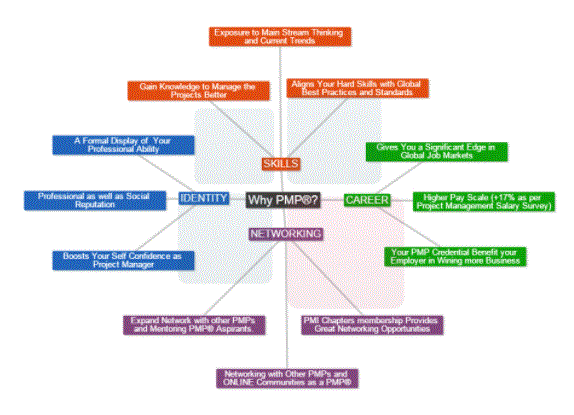
- Initiation
- Starting the project and defining goals
- Plan
- Determination of scope and project planning, considering cost, quality, resources and time
- Implementation
- Meeting project deliverables
- Monitoring and control
- Measuring project performance and progress during the execution phase and at the end of execution.
- Ending
Getting Project Management Experience Without a PMP:
First, you don’t need to have previously earned a project manager title to gain project management experience. You likely already have experience. Have you been a team leader? Have you participated in the testing or evaluation of a solution? Have you taken the lead in organising a food campaign or coordinating a charity effort? All of these things can be considered project management experience.
When reporting your experience for your PMP certification, you will be asked to list your experience in the following five categories:
Reporting and storing project results:
Start by reviewing your past posts. Remember that you do not need to work as a project manager to perform relevant project management tasks and duties. You may already have some experience under your belt, but this does not include operational, administrative or routine tasks. If you don’t have enough previous experience to meet the PMP requirements, don’t fret. There are several ways to get the knowledge you need:
volunteer experience:
Keep your eyes and ears open for opportunities to volunteer to manage “project-like” efforts. You may find that you can help set up a food drive for your child’s school, help your church set up its website, or help coordinate the efforts of a 5K run for a nonprofit. can do. All these can be opportunities to gain the necessary experience.
Side hustle hours
You may be able to find a part-time side gig to lead or assist in a project management effort. If this is something you might consider, try searching one of the many freelance job sites like Upwork or Freelancer.
Step to work
Even in your current position, you may be able to volunteer to participate in a project. Remember that participation in Performance (Category #3) or Monitoring and Control (Category #4) may matter to your experience needs.
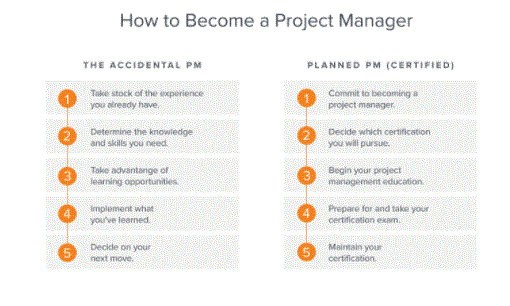
Jobs that Give You Project Management Experience:
If you are looking for a new job opportunity or want to change careers, few positions have project management responsibilities without the project manager title. Consider roles such as:
personal assistant
Personal assistant organisations are gurus. You’ll hone your time management and organisation skills, and you’ll have many smaller projects that require the right project management tasks and responsibilities.
Business Analyst
Business analysts are often tasked with gathering requirements that eventually become part of a project, or are delegating tasks during the execution of a project.
Event organiser
Event organisers do a lot of planning and coordination just like a project manager. Each event will take on similar traits as a project. Events have a beginning, and an end, a budget, a scope, and bringing them from idea to reality requires coordination.
Office administrator or manager
Both roles carry a variety of responsibilities, most of which are valuable to a project manager. This role requires excellent communication and organisation skills, along with the ability to plan and execute large tasks. And like the other roles mentioned here, you’ll probably lead smaller projects that require project management skills.
Training Coordinator
Training coordinators have the benefit of being both part of a larger project and managing their own. On larger projects, training is often a component, allowing you to participate in a project. The task of developing a curriculum or training plan for a department or group can be viewed as a project, requiring the same skills as a project manager.
This Is What A White Collar Worker Looks Like After PMP Certification:
The failing economy has put many people’s jobs at risk and white-collar workers are among the most severely affected. These workers were indispensable to an organisation till a few years back. But the presence of a cheap workforce from outsourcing has resulted in the loss of jobs for white-collar workers. The only way to retain jobs is to provide employers with the knowledge, skills and abilities that are needed in the market right now. There is a shortage of talent in the IT industry and these organisations need employees who have the skill set and mindset to match the corporate culture and realise the organisational vision.
So what new skills can a white-collar worker acquire to fit in the IT industry? One training framework that would be appropriately suited to white-collar workers is the Project Management Professional Certification. A white collar worker by definition is one who performs professional, managerial or administrative functions. The role of a project manager is closer to this role and is therefore actually an extension of a white-collar job such as corporate or managerial positions. For any professional to climb the corporate ladder, they must not only show proficiency in industry acumen, but must also show leadership and motivational qualities. PMP equips you with analytics, management and team skills—skills that are in high demand across all sectors. With PMP certification, a white collar worker will be able to:
Show Results: Your project management skills will help get things done. You will learn the art of planning, organising and controlling resources and this will help you achieve goals and meet organisational objectives. You will shine among your peers and attract the attention of your management.
Show Efficiency: Project Management is all about being efficient and PMP is a reflection of your efficiency and commitment. By understanding project management best practises outlined in A Guide to the Project Management Body of Knowledge – Fifth Edition (PMBOK®Guide), you will become proficient in not only executing your projects but in all areas of life.
Improving Communication Skills: Communication is the key to successful project management. In fact the lack of clear communication channels between the stakeholders, the team and the project manager is cited as one of the most frequent reasons for project failure. PMP will teach you how to effectively communicate roles and responsibilities to your team members and open dialogue with stakeholders. As a PM you have to act as a bridge between the customers and the team, articulating the requirements with clarity and PMP helps you do that.
Stick to Schedule: Any dedicated professional worth his salt will know the importance of sticking to a commitment. PMP teaches you how to complete tasks within deadline, budget and allocated resources. You will acquire the skills to complete tasks and deliver the quality that you have ensured to customers. This is the benchmark of a successful PM which will also help you gain the trust of your peers and customers.
Show adaptability: Projects are becoming increasingly complex and so do customer requirements. With so much volatility associated with projects, it is not uncommon for requirements to change at the last minute. PMP teaches you how to handle change management and how to deal with them effectively. You will learn to be adaptable and ready for changes.
Inspire and Motivate: PMP is a powerful leadership tool. It not only teaches you to stick to your goal and achieve it but also instils in you the passion to be successful. And people are motivated by those who show excellence and commitment towards their responsibilities. Your team members will look to you for inspiration and you will guide them towards their goal, towards success.
Conclusion:
Getting your PMP certification is a high achievement, and you should be proud of the achievement. However, think of it as a step in your career, not the end goal. From taking advantage of your new certification status to continuing your education and more, there are many new opportunities that come with becoming a PMP credential holder.
A PMP certification can help you showcase your skills and get your work recognized globally. It gives you the opportunity to prove your experience and competencies to lead and direct projects. Obtaining PMP certification can prove to be an investment in your professional and personal development.


